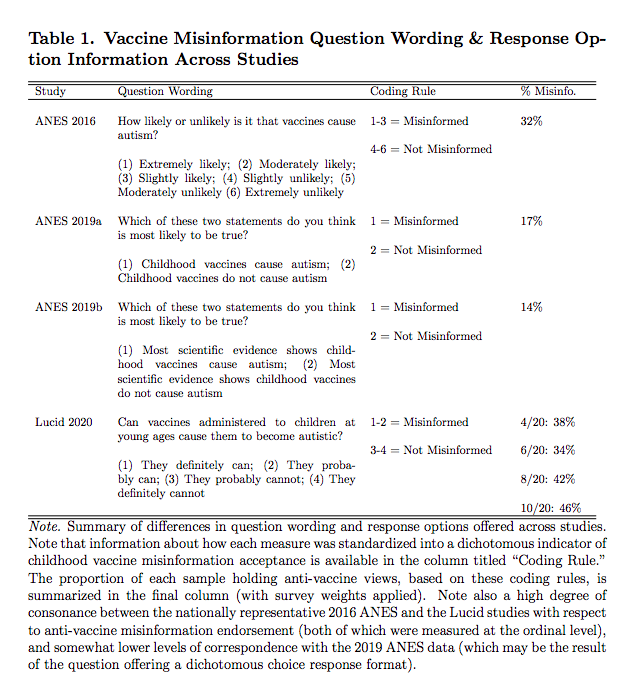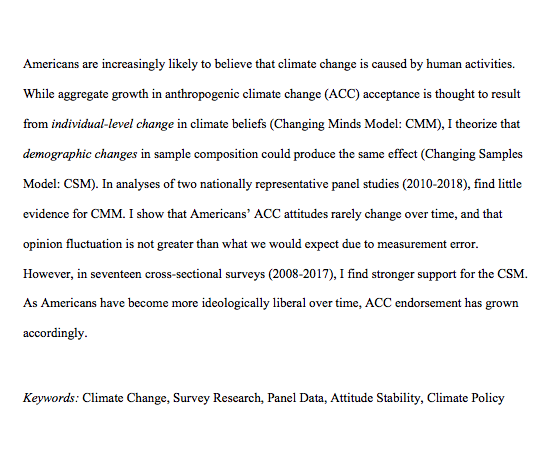
NEW at PGI: Anti-vax beliefs are more than just views about sci/med. For many, they're a form of social identity.
@THCallaghan, @klunztrujillo, @ssylvester82 and I study the health policy consequences of "Anti-Vax. Social Identity" (AVSID).
[THREAD]
tandfonline.com/doi/full/10.10…



@THCallaghan, @klunztrujillo, @ssylvester82 and I study the health policy consequences of "Anti-Vax. Social Identity" (AVSID).
[THREAD]
tandfonline.com/doi/full/10.10…




About a third of Americans express doubt about the safety of childhood vaccines. For some, these views may simply be the result of well-studied social, political, and psychological forces that inspire doubt about vax. safety.
sciencedirect.com/science/articl…
sciencedirect.com/science/articl…
For others, however, anti-vaccine views may be much more than that. By our estimates, 22% of Americans always (8%) or sometimes (14%) identify as "anti-vaxxers;" i.e., part of a social movement/group that opposes expert-recommended vaccine protocols.
In this work, we asked whether or not this latter group might view the "anti-vax" label as central to their sense of self -- i.e., as a form of "social identity."
There is good reason to suspect that it might...
There is good reason to suspect that it might...
Anti-vax webpages are not one-directional streams of misinfo. about childhood vaccines.
They're often organized as socially mediated *communities;* offering opportunities for discussion, support, and social bonding.
sciencedirect.com/science/articl…
They're often organized as socially mediated *communities;* offering opportunities for discussion, support, and social bonding.
sciencedirect.com/science/articl…
People who hold anti-vaxx views may therefore turn to anti-vaxx communities to fulfill universal needs to belong to social groups.
As they do, group membership may become more tied to their sense of self, and inspire opposition to out-group members.
books.google.com/books?hl=en&lr…
As they do, group membership may become more tied to their sense of self, and inspire opposition to out-group members.
books.google.com/books?hl=en&lr…
Importantly: as community membership becomes more tied to one's sense of self, people have a stronger motivation to reject *threats* to one's identity; in this case, scientific evidence about vaccine safety.
journals.sagepub.com/doi/abs/10.117…
journals.sagepub.com/doi/abs/10.117…
In this paper, we propose and validate a new measure of anti-vaccine social identity (AVSID); swapping partisan for anti-vaxx language in @LilyMasonPhD and colleagues' partisan social identity measures (see below). 



Here's what we find:
1.Most self-identified anti-vaxxers score above the AVSID scale's midpoint; especially those who most strongly associate with the anti-vaccine label.
1.Most self-identified anti-vaxxers score above the AVSID scale's midpoint; especially those who most strongly associate with the anti-vaccine label.

2. Anti-expert attitudes strongly influence whether or not people identify as anti-vaxxers, and whether or not anti-vaxxers then also see the label as central to their sense of self.
nature.com/articles/s4156…
nature.com/articles/s4156…

3. So too does "medical folk wisdom" -- i.e., the tendency to subscribe to intergenerational, widely held, and (often) benign forms of misinformation about medicine and health.
nature.com/articles/s4159…
nature.com/articles/s4159…

4. Worryingly, and perhaps most importantly, AVSID motivates opposition pro-vaccine policies. While most self-described anti-vaxxers oppose school vax mandates, those scoring highly on AVSID are *nearly unanimous* in their opposition. 

Our work implies that correcting anti-vaccine misinformation (and addressing its policy influence) may be made more difficult by the fact that anti-vaccine views are a form of social identity for many anti-vaxxers.
Thanks so much for reading!
@JenSpindel this is the other piece we talked about!
• • •
Missing some Tweet in this thread? You can try to
force a refresh











